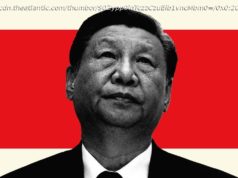 President-elect Donald Trump says he will push China hard on trade — and many are wondering how Beijing will push back.
President-elect Donald Trump says he will push China hard on trade — and many are wondering how Beijing will push back.
A number of Beijing watchers say leaders there are already brainstorming ways to reply if Trump does in fact push forward with trade agreements that make life harder for Chinese companies that export into the United States.
“China will try to have a disproportionate response. If the U. S. action is ‘X,’ China’s reaction will be ‘2X,'” said James Keith, who leads the Asia practice of geopolitical consulting firm McLarty Associates and is the former deputy assistant Secretary of State for China.
Keith, who was also former director for China on the National Security Council, said the most practical response would be slapping a tariff on U. S. exports to China, which would likely hurt large multinational corporations that rely on trade with the world’s second largest economy.
“China will attempt to educate the new administration the cost of a trade war,” said Keith.
Experts at think tank Capital Economics agree that imposing a similar tax or tariff on companies that rely on trade or business with China is a plausible scenario.
“U. S. companies would find their products and operations in China subject to tighter regulation that hampered their capacity to do business there,” wrote Mark Williams, chief Asia economist at Capital Economics, in a research note to clients in mid-November.
A trade war would most likely have a negative effect on China’s economy, thereby pushing policymakers there to open the floodgates with easy money or other stimulus.
Williams forecasts that Beijing’s leadership team would try to offset any weakness in its economy that stemmed from a drop in export demand by loosening its monetary or fiscal policy.
“Stimulus is one thing China’s government does well,” wrote Williams.
Wells Fargo points out that this could help China accelerate its push to become a consumption-based economy.
“Instead of trying to duke it out on the trade front with the U. S., they [China] may try to become less dependent on growth and demand from its biggest trading partner, and try to invest in domestic growth,” said Sameer Samana, global quantitative strategist at Wells Fargo Investment Institute.
Wall Street is most fearful of a Chinese yuan that weakens significantly against the U. S. dollar.
The last two times the People’s Bank of China has allowed the yuan to fall significantly against the dollar, global stocks responded violently. Beginning in 2016, however Beijing has done the exact opposite — defending the currency in order to counter the rally in the U. S. dollar.
Last week, the offshore Chinese yuan that trades in Hong Kong posted a record two-day surge, easing concerns that another one-off devaluation may take place in 2017. Some traders say that Beijing is attempting to shield itself from the “currency manipulator” label that the president-elect often throws China’s way.
Despite last week’s move, however, currency strategists still see the yuan gradually depreciating against the dollar in 2017, by around 5-6 percent.
North Square Blue Oak, a China policy investment bank, told CNBC that the biggest uncertainty for the yuan is whether the incoming U. S. administration will follow through on its previous rhetoric, in particular its talk of implementing tariffs on Chinese imports, spending heavily on U. S. infrastructure, and slashing U. S. corporate taxes.
Duncan Wrigley, chief strategist at North Square Blue Oak, also sees Trump’s handling of Taiwan being a key focal point for investors.
“There is the black swan of escalating Sino-U. S. military confrontation” that stems from Trump’s “casual attitude toward the long-standing U. S. one-China policy,” he said.
Keith of McLarty Associates concurred: “If the U. S. shifts its position on Taiwan independence, then all parts of U. S./China relations will be affected. “






